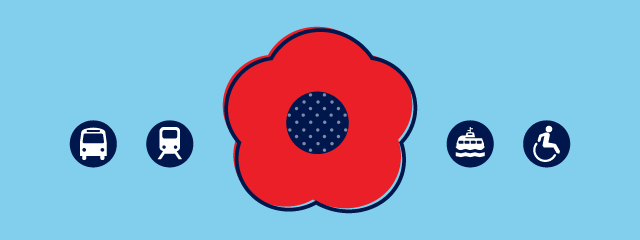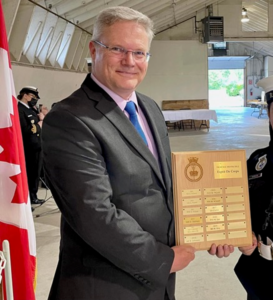How CMBC partsperson Phil Blanchard nurtures leadership and remembrance in young Canadians
How CMBC partsperson Phil Blanchard nurtures leadership and remembrance in young Canadians

When he’s not working as a Partsperson at Coast Mountain Bus Company’s (CMBC) Port Coquitlam Transit Centre, Phil Blanchard is a Civilian Instructor with the 354 Royal Canadian Sea Cadet Corps (RCSCC) Invincible. He has a long-standing connection to the cadet program.
As a youth, he was a cadet and as an adult became a Reserve Officer with the Royal Canadian Army Cadet Corps. Phil later returned as a Civilian Instructor when his daughter joined 354 RCSCC. In his role, Phil helps cadets develop citizenship, leadership, and confidence— qualities central to the Canadian Cadet Corps.
The Canadian Cadet Corps, a program for youth aged 12–18, fosters leadership, teamwork, and essential life skills. While cadets are not members of the Canadian Armed Forces and are not expected to join, they do valuable training activities tied to their respective elements: Sea, Army, or Air Cadets.
Sea Cadets, for example, gain seafaring skills, Army Cadets engage in outdoor adventures, and Air Cadets learn the principles of aviation.
“One of the most rewarding aspects of my journey — from Army Cadet to Civilian Instructor — is building lifelong friendships, helping cadets gain a broader perspective of the world, learning what Remembrance Day means, and most importantly, helping develop Canada’s youth to become strong and confident leaders for tomorrow,” Phil shares.

When asked what Remembrance Day means to him, Phil speaks with deep respect:
“I have a very acute appreciation for the veterans who served and continue to serve our country. As I grow older, I think about how, during World War II, an 18-year-old could be in charge of a bomber or lead a department on a ship crossing the Atlantic. At that time, 20- to 25-year-olds were considered old and many didn’t reach the age I am today. It gives perspective on what that generation had to grow up with and realize the tremendous sacrifice it took to have the Canada we live in today.”
Preparing cadets for Remembrance Day is an integral part of Phil’s role as a Civilian Instructor.
“I want to help cadets understand what it means to serve and remember. The cadet program teaches life skills, as well as service and remembrance,” he explains. Each year, cadets prepare for the Remembrance Day ceremony and participate in the parade that ends at the cenotaph, where they pay their respects.
“Veterans from the Royal Canadian Legion share their experiences, showing cadets they were their age when they served. It helps cadets understand the tremendous sacrifice it took.”
The Cadet program builds character and also encourages cadets to contribute meaningfully to their communities.
Phil notes, “As World War II veterans pass, the torch is being passed to those who served more recently, like in Afghanistan. For cadets, WWII can feel like a foreign concept, but hearing from a veteran who served more recently in a combat zone makes it more relatable. They see someone younger, and hearing the stories of service resonates with them more deeply.”
This Remembrance Day, as we honour those who have served, Phil’s dedication reminds us of the significance of service. Programs like the Canadian Cadet Corps instill in younger generations an understanding of what it means to serve, remember, and carry forward the values that so many have given their lives to defend.





